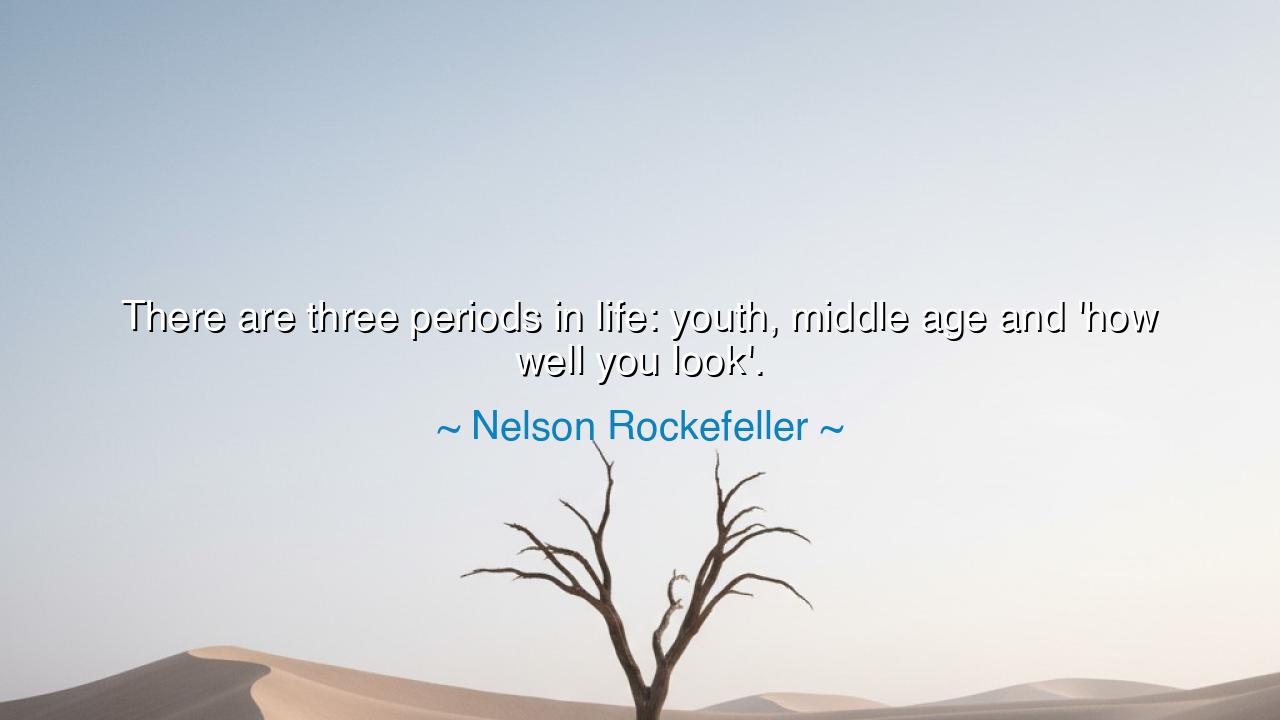
There are three periods in life: youth, middle age and 'how well






"There are three periods in life: youth, middle age and 'how well you look'." These words spoken by Nelson Rockefeller offer a thought-provoking reflection on the stages of life and the evolving nature of how we are perceived by the world and how we perceive ourselves. What Rockefeller elegantly points out is that the course of one’s life is not simply about the passing of years, but about the shifting focus of society and self. In youth, we are celebrated for our vitality, energy, and potential, and in middle age, we are often defined by our accomplishments and our place in the world. But as time progresses, there comes a point where the external becomes the focus—where appearance begins to eclipse accomplishment, and youthful vigor makes way for the appearance of well-being.
In the ancient world, the concept of age and appearance was also a subject of much reflection. The Greeks, for example, celebrated the beauty of youth and the physical form as a reflection of divine favor, but they also recognized the wisdom that came with age. In Homer’s Odyssey, the hero Odysseus returns home, older and worn, but his wisdom and perseverance make him a figure of respect. Though his body had aged, his mind had matured in ways that youth could not yet understand. This idea persists throughout history—the balance between the physical and the intellectual, and how society shifts its attention from one to the other as we journey through life. Rockefeller's words highlight the irony that as we grow older, society's focus often moves away from our inner qualities to our outer ones, as though our appearance becomes the most important measure of who we are.
Consider, O children, the life of Julius Caesar, who, though a military and political leader in his prime, began to age in the public eye. While Caesar’s mind and strategic brilliance were unquestioned, his physical appearance began to show signs of wear. Yet, the Roman people still revered him, not because of his appearance, but because of his accomplishments. The shift in focus from the mind to the body—or the look of health—is evident in how later emperors, like Augustus, were often depicted with youthful, idealized portraits, as though their physicality were a reflection of their greatness. Caesar’s story reveals the tension between the value of intellect and the societal shift toward the importance of how one appears to others.
But Rockefeller’s point is also a reminder—this shift is not necessarily a negative one, but one that comes with the territory of growing older. The ancients knew well that youth was a fleeting gift, one that was not to be idolized, but respected. In middle age, the body’s strength may begin to fade, but the wisdom and accomplishments of a life well-lived begin to take precedence. Middle age becomes a time when we reflect not only on what we have done but on who we have become. Rockefeller's statement, though lightly phrased, offers a poignant reminder that there is a natural arc to life, and that as the focus shifts from youthful energy to appearance, we must remember to maintain a deeper understanding of our own worth—one that transcends the physical.
Think, O children, of the story of Leonardo da Vinci, who, though his body aged, never ceased to innovate and create. In his later years, da Vinci was celebrated not for his youthful appearance, but for his contributions to art and science. As middle age crept upon him, and his body grew weaker, his mind continued to flourish. Da Vinci’s genius was not defined by his looks but by his ability to innovate and to integrate his various passions into something far greater than himself. His legacy was not shaped by how well he looked but by what he contributed to the world. This is the heart of what Rockefeller is saying: it is not the outer image that defines us, but the impact we leave, the work we have done, and the integrity with which we live our lives.
So, O seekers of wisdom, let Rockefeller’s words be a guide. Youth will come and go, middle age will eventually arrive, and with it, the physical signs of life lived. But in this journey, let us not become consumed by how well we look—for our true worth lies not in the appearance of youth or the preservation of our physical beauty, but in the wisdom we accumulate, the knowledge we share, and the legacy we leave behind. Let us remember that middle age is not a time of decline, but a time of integration—when we begin to realize that our inner strength and our accomplishments define us more than the image we present to the world.
Therefore, let us strive to live with purpose, to cultivate not just the physical form but the mind and spirit. When the gaze of society shifts from what is seen to what is felt, may we find comfort and confidence in the wisdom of middle age, knowing that our worth is never dictated by how others see us, but by the depth of our experience and the authenticity of our life’s journey. For in the end, it is the impact we make, not the image we project, that will live on through the ages.






AAdministratorAdministrator
Welcome, honored guests. Please leave a comment, we will respond soon